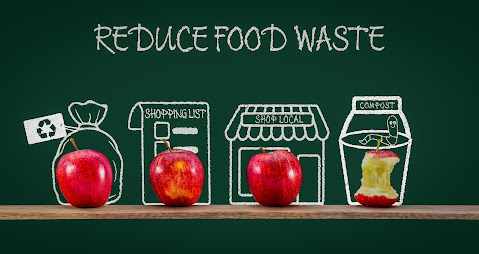Reducing Wasted Food Save Our Lives
We live with surrounding tons of food. If you go to a grocery store, you can see various kinds of groceries, from fresh foods to frozen food, beautifully displayed in the large store. In the USA, which has vast lands and is thriving in agriculture, most people are comfortable with food, and on the contrary, is more than the necessary amount of food around us.
We are happy to have a lot of food, but it's also true that we are producing a lot of "Wasted Food."
I would like to explain the difference between Food Loss and Food Wasted. According to FoodPrint, Food Loss is a large category and includes all food such as crops left in the fields and damage caused during transportation, including food discarded in our homes. This includes food leftover after the reservation is canceled at the restaurant. On the other hand, wasted food mainly has leftover food from each household and food waste when preparing meals.
Surprisingly, about 40% of all food is discarded in the United States, with 125 to 160 billion pounds discarded each year. This tremendous amount of Wasted Food threatens the upcoming food crisis and is heavily involved in climate change. When we waste food, we waste the energy and water needed to grow, harvest, transport, and pack. And it's also true that while some people are wasting food, they aren't able to supply it to those in need, such as homeless people. As a result, they do not have enough food and nutrition, and many suffer.
We need to think seriously about what each of us can do about the wasted food problem.
The EPA (the United States Environmental Protection Agency) mentioned that the benefits of reducing wasted food have a significant impact on our lives and help many those who need food.
For example:
1. Save your money by buying food in a planned manner
2. Reduce the amount of methane gas produced when producing food
3. Conserves energy and resource.
4. Donate wasted food to people who don't have stable food, such as homeless people.
So, what can we do to reduce the wasted food?
First, plan your shopping. In my case, I plan about the menu for a week before shopping and try to buy only the ingredients I need. For your information, you can make a salad with fresh vegetables and put the scraps in the soup, or you can boil the veritable leftovers to make a broth. If you want to get more information, click here.
Reducing wasted food is very important to review the excess food supply, and then donating the collecting unspoiled, healthy food to those in need is necessary for food problems.
See the hierarchy below. You can see the importance of feeding hungry people to impact our society.
Did you know that wasted food also contributes to climate change? Wasted food produces methane gas which negatively contributes to climate change.
Do you remember the other day, there was a record heavy rain, which caused damage such as landslides in Oregon? In addition, forest fires are on the rise in the summer, and climate change has become a more severe problem in our lives than ever before.
If we can solve the wasted food problem, it would help people in need and prevent climate change. Even though what we can do is a tiny step, we believe that it will make a big difference if each person puts it into practice.
For more information, click the below links.
https://www.epa.gov/sustainable-management-food/reduce-wasted-food-feeding-hungry-people
https://www.worldwildlife.org/stories/fight-climate-change-by-preventing-food-waste



Comments
Post a Comment
Let your knowledge, ideas, and innovation be heard. Tell us what you think and know about this topic.